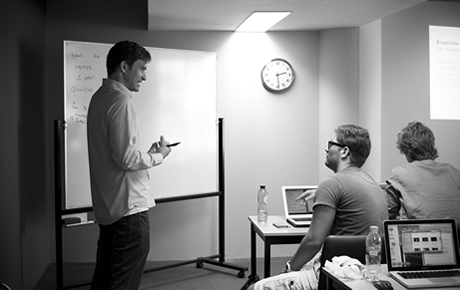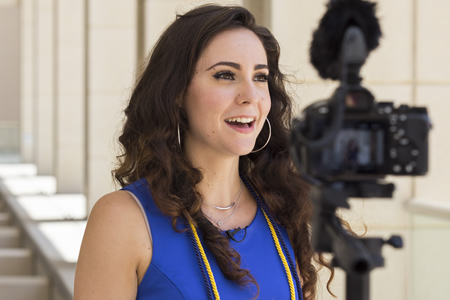| Courses | European Credits (EC) | |
| Courses from the Communication Studies cluster | 6 | 12 |
| Total | 6 | 12 |
|---|
Graduate Programs / Graduate Certificate in Communication Studies
Starting dates
Our academic calendar is based on a quarter system (1 quarter = 10 weeks). Because of the program's flexible structure and modular design, multiple starting dates are available at the start of every Quarter and of every Term, in October, November, January, February, April, May, July, and August. All campuses follow the same academic calendar.
Program duration
Part-time students can complete this Graduate Certificate program in 9 to 12 months, depending on the number of courses attempted per quarter, the course selection and the course planning. Students are considered part-time while attempting 6 or fewer courses per quarter. Part-time studies are available only for students with a national passport or residence permit. Alternatively, part-time studies can be combined with online courses.
Teaching schedule
Courses are available in various formats, including daytime courses between 8.30 and 18.30, seminar courses with visiting professors on consecutive days, online courses available 24/7, and at certain campuses also evening courses from 19.00 to 22.00 and weekend courses on Saturdays, or any combination in a blended format. Courses are scheduled typically in sessions of 3 hours each. Connect with an admissions advisor, or refer to the course planning once enrolled to find out more about course availability in specific formats throughout the academic year.
Program language
All courses are taught entirely in English across the campus network. Students should have a certain proficiency in English when they start. Students may have English as a native language, may have had English as the language of instruction during previuos studies, may have had advanced English langauge courses during previous studies, may have an English language school certificate, and/or may have scores from standardized tests such as TOEFL or IELTS. Refer to the table below for further details on required scores for standardized tests and language school certificates (CEFRL). Depending on the submitted documentation, students may be subjected to an English test at the start of their studies. Typically, non-native speakers who studied in English before or those who had advanced English lessons during previous studies, and with sufficient confidence, perform well. Because of the multi-cultural environment, only a relatively small percentage of students are native speakers.
| additional English lessons | TOEFL | IELTS | CEFRL | English Test |
|---|---|---|---|---|
| optional | 60 or higher | 6.0 or higher | C1 or higher | 80% or higher |
| recommended | 46 to 59 | 5.5 | B2 | 60% to 79% |
| mandatory | 45 or lower | 5.0 or lower | B1 or lower | 59% or lower |
Study destinations
Our campuses are all located in the city center of several exciting destinations. Students are encouraged to transfer between campuses for one or more quarters, but may also choose a single campus as their destination of choice. Students who prefer shorter periods abroad can join our seminar courses taught by visiting professors at several of our campuses throughout the academic year.
Program schedule
All campuses offer identical study programs and follow the same program structures for an interruption-free experience. However, not all courses are taught face-to-face at all campuses. Some courses are organized in a hybrid format (partially face-to-face, partially virtual), and some only virtually. Some programs are therefore also only available in a blended format, with some courses face-to-face, hybrid or virtually. Blended programs (and hybrid courses) are an excellent option for independent students as well as for globetrotters travelling far beyond the reaches of our campus network.
Global study trip
Each academic year, students from all campuses in Europe, as well as students from our academic partners can join our Global Study Trip to Tokyo, Japan. The weeklong trip is packed with cultural excursions, company visits, social activities and an Asian Management seminar.
Application deadlines
Our Admissions Department applies a rolling admissions process and does not set deadlines to submit applications because of the multiple starting dates available. Applications are reviewed continuously troughout the year. Only in case a student visa is required do we recommend to apply 1-3 months prior to the intended starting date.
Admission requirements
Students should be fluent in English, and have obtained a Bachelor degree (or equivalent). Refer to the application process for further details on the recommended English language levels.
Degrees with 180 European credits or 120 American semester credits are considered equivalent. Other degrees can be submitted along with your application for review by our Admissions Department. No distinction is made between academic or professional Bachelor degrees.
Students who do not hold a business-related Bachelor degree or equivalent may be required to complete an inbound assessment test prior to starting the program, and, depending on the results, earn an additional number of credits in leveling courses from the Pre-Master foundation program in order to be fully prepared for our graduate programs.
Students who have 15 or more years of relevant work experience may apply directly for the Pre-Master program and will be required to complete an inbound assessment test prior to starting the graduate program, and, depending on the results, earn an additional number of credits in specific undergraduate courses.
Program fees
Program fees are calculated pro-rata per campus where the student completed courses and earned credits. The total fees are due payable on a quarterly basis on a fixed payment schedule. Program fees cover matriculation and tuition fees but do not include the cost of living, housing, travel, transport, health insurance, study materials and other expenses. For more details, refer to the document attached.
Credit system
Graduate Certificate programs consist of 12 European credits, equivalent to 8 American semester credits. Courses are assigned a number of credits, indicating the estimated workload. Each credit equals up to 30 learning hours, including contact hours, exam hours, self-study hours and group-study hours. The workload of a typical full-time graduate student amounts to 20 credits and 600 learning hours per quarter. The workload of a part-time student depends on the number of credits attempted per quarter.
| Program | European Credits (ECTS) | American quarter credits | American semester credits |
|---|---|---|---|
| Master | 60 | 60 | 40 |
| Diploma | 24 | 24 | 16 |
| Certificate | 12 | 12 | 8 |
Grading system
Students are assessed on a combination of attendance, participation, individual assignments, group assignments and exams. Assignments may include reading materials, term papers, reports, presentations, and others. The combination of these assessments provides students with an equal opportunity to demonstrate their skills and knowledge. The minimum passing grade is D (60%). In case of an FX grade, students have the option to request a second exam in order to obtain the minimum passing grade of 60%.
| Percentage | Grade | Definition |
|---|---|---|
| 90 to 99 | A | Excellent |
| 80 to 89 | B | Good |
| 70 to 79 | C | Average |
| 60 to 69 | D | Poor |
| 50 to 59 | FX | Unsatisfactory |
| 0 to 49 | F | Fail |
Honor system
Students who achieve a certain GPA (Grade Point Average, or the weighted average of all grades earned, calculated on a 4.0 scale), will have their academic honors listed on the academic transcript issued together with the diploma.
| Percentage | GPA | Academic Honors |
|---|---|---|
| 90 | 3.6 | Summa Cum Laude |
| 85 | 3.4 | Magna Cum Laude |
| 80 | 3.2 | Cum Laude |
Academic degree
Upon successful completion of the study program students receive an international Graduate Certificate in Business Studies awarded by the school's headquarters in Zurich, Switzerland, based on the recommendation of the faculty of the local campuses where credits were earned. Learn more about the school's academic degrees and accreditation.



















